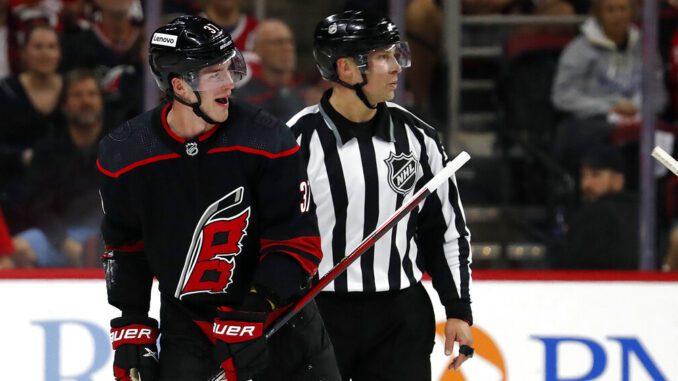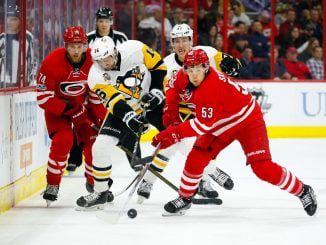
RALEIGH — Something happened on the way to the Stanley Cup.
The NHL’s referees, once known for swallowing their whistles in the postseason, can’t get enough of raising their arms and filling the penalty box.
Through four games of the Hurricanes’ series with Boston, there have been 120 penalty minutes. Outside of the 10-minute misconduct handed down to the Bruins’ Trent Frederic at the end of Game 1, those minutes have come on 53 minor penalties called in the series.
In the Toronto-Tampa Bay series, there have been 48 minors through four games. Forty-three in the Edmonton-Los Angeles series; another 47 between St. Louis and Minnesota.
Both the Bruins and Hurricanes have averaged around eight minutes of power play time per game in the first four games of their series. In the regular season, Carolina had 4:27 of man-advantage time, while Boston registered 4:41.
On the surface, the increased special teams would seem to benefit the Hurricanes. Carolina easily led the league with its 88.0% penalty kill and was in the top half of the league with a 13th-ranked 22.0% power play.
The Bruins, meanwhile, were 15th on the power play at 21.2% and ranked ninth in killing penalties at 81.3%.
But there’s no denying that Boston’s power play, despite the middle-of-the-pack numbers, is one of the elite ones in the NHL.
While the Bruins have seemingly thrived on the power play through four games, they’re converting at a 22.7% success rate — just slightly higher than their regular season production. It’s not so much about Boston’s success as its ability to do so against Carolina’s vaunted penalty kill.
Furthermore, the Hurricanes’ power play has stumbled in the series, converting at just a 9.1% rate. The number is a little deceiving since Carolina has had several abbreviated penalties, including end-of-game power plays that were just seven and three seconds long in Games 1 and 4, respectively. But the Bruins have still had about twice the success Carolina has had.
And when there is twice as much power play time as teams are used to, it becomes an even bigger factor.
“We took a lot of penalties today, and obviously it killed us,” said Hurricanes forward Andrei Svechnikov following Sunday’s Game 4. “They’ve got a good power play. We’ve gotta look for that and take less penalties, that’s for sure.”
Behind the scenes, the Hurricanes are frustrated with the way the series has been officiated.
Further complicating matters is Carolina has been the better team at 5-on-5. Take away Boston’s five power play goals, one empty-netter and one shorthanded goal, and the Bruins have managed just five goals at full strength in the series. The Hurricanes have 10 goals at 5-on-5.
But when more than a quarter of the first 240 minutes of the series have been played at 5-on-4, it puts the Hurricanes at a disadvantage, regardless of what the season-long numbers say.
“If we take that many penalties like the last couple of games,” Hurricanes goalie Antti Raanta said after Game 4,” that’s been pretty much the game the last two games. … It just takes a lot out of the guys that are killing the penalties. Even if you can kill the penalties, you will struggle getting back to that 5-on-5 game.”
While the Hurricanes have kept the grumbling about the way penalties are being called to a murmur, coach Rod Brind’Amour didn’t hesitate to vent about how two similar goaltender interference calls have gone against his team in the four games.
The goal by Boston’s Jake DeBrusk in Game 4, when the Bruins forward used his stick to spin Raanta around before locating the loose puck and tying the game late in the second period, was challenged by Carolina but upheld.
Boston scored the go-ahead goal on the ensuing delay of game penalty, helped along by Sebastian Aho’s high-sticking double-minor early in that kill, to seize control of the game and eventually even the series.
“You can’t play the puck when it’s in between (Raanta’s) legs from the side and knock the goalie sideways, turn him to squirt it out,” Brind’Amour said. “If you can, then I don’t know how (Nino) Niederreiter’s goal isn’t a goal in the first game when they said, ‘100% not a goal.’ … They’re too good a team to just give them goals. We have no chance if that happens.”
What was once a 2-0 series lead for Carolina is now a best-of-three. The Hurricanes still have a chance.



